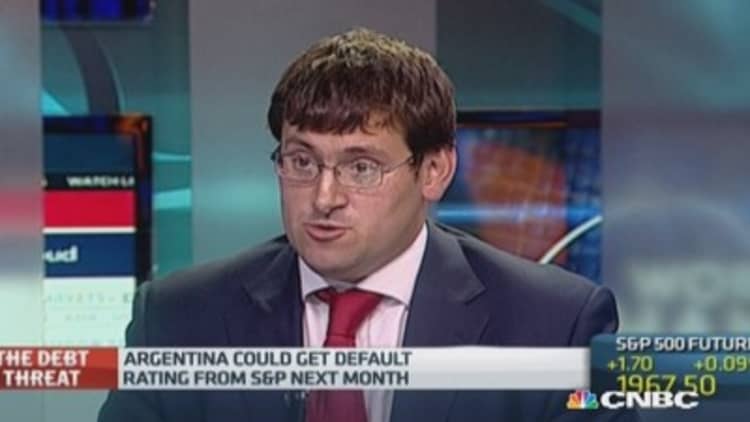After Argentina's defeat in the US courts in its decade-long dispute with hedge funds, President Cristina Fernández will turn to the leaders of China and Russia for support when they visit Buenos Aires this month.
Argentina hopes for more than just political backing for its battle against so-called holdouts when Russia's Vladimir Putin arrives on Saturday before a Brics summit of emerging market economies – Brazil, Russia, India, China and South Africa – in Brazil next week, with China's Xi Jinping following a week later.
Analysts say the gigantic Vaca Muerta shale formation in remote Patagonia is the motive behind both Chinese and Russian interest in Argentina, while Buenos Aires desperately needs foreign investment to develop what are the world's second biggest shale gas reserves and fourth largest shale oil reserves.
Read MoreUS urges Argentina to find solution
Argentina has been locked out of the capital markets since defaulting on almost $100 billion of debt in 2001 but relations with international investors are gradually returning to normal, with the government resolving a series of disputes in recent months.
"The fact that both Putin and Xi are sitting down with an Argentina that repays its debts is very different from doing so with an Argentina in default," said Carlos Germano, a political analyst. "If the latter were the case I don't know whether they would come to Buenos Aires."
Most recently, Argentina has raised hopes that it will negotiate with holdout creditors who refused to accept debt restructurings after the default, with the US Supreme Court last month rejecting the country's appeal to review a lower-court ruling that it must pay them in full.
More from the Financial Times:
Cheerful Pope ready to reform Vatican
The world's most expensive cities for expats
Cornprice wilts on bumper crop forecast
Still, officials privately express disappointment that Bridas Corporation, one of the top energy companies in Argentina in which a 50 per cent stake was acquired by the China National Offshore Oil Corporation in 2010, has still not made any commitments to invest in Vaca Muerta.
Eduardo Levy Yeyati, an economist from the Elypsis consultancy in Buenos Aires, doubts that there will be new investment announcements during the presidential visits, dismissing reports that Gazprom may be interested in investing in Vaca Muerta as rumors.
Chinese companies are already due to firm up major investments in hydroelectric projects in Patagonia and a railway linking Argentina with Chile's Pacific coast that could strengthen China's status as Argentina's top trade partner – not only the main destination for its abundant grain exports, especially soya but also a major source of imports of electrical goods.
Read MoreArgentina saysUS judge biased
Mr Yeyati said plans were being revived for a $10 billion currency swap with China. It would enable the Asian giant to receive renminbi for its exports to Argentina, taking pressure off shortages of dollars in Buenos Aires as it remains unable to borrow abroad until the holdouts issue is resolved.

Although not a reserve currency, the increasing use of renminbi in trade finance could help contribute to China's growing financial clout as the Brics countries prepare to launch a development bank in Brazil on July 15 that will challenge US dominance of multilateral lending institutions.
The visit of both Mr Xi and Mr Putin to Buenos Aires marks a major step forward for Argentina, after being branded a pariah when it defaulted in 2001.
Read MoreArgentina's debt fight: What it is & why it matters
"It's a moment of great importance in Argentina's international reinsertion after over a decade of isolation when no leaders of importance came to Argentina," said Jorge Castro, a specialist in international relations. "But they are beginning to arrive again."
Mr Castro said the government has been greatly strengthened since a policy U-turn after its poor performance in midterm elections in October. He pointed to a devaluation in January that stemmed a rapid decline in foreign exchange reserves, and agreements both to compensate Spain's Repsol after the expropriation of its Argentine assets in 2012, and to repay a longstanding $10 billion debt with the Paris Club of creditor nations.
Now, after years of the government staunchly refusing to negotiate with the holdouts, Argentine officials are due to return to New York on Friday to continue preliminary talks over payment in an attempt to avoid a second default in 13 years at the end of this month.
Read MoreArgentine holdoutswill discuss extension
"Last year the government was in freefall but that situation has been reversed," Mr Castro said. "The fact that the government is negotiating is key."

